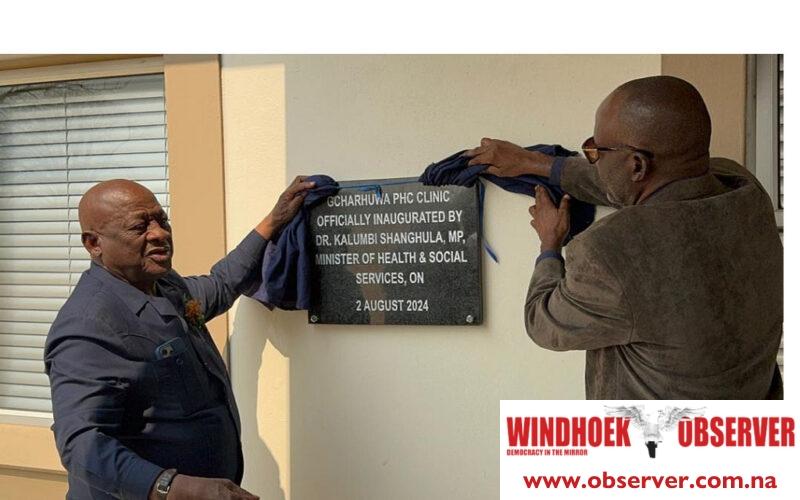Niël Terblanché
Namibia has officially taken another step towards achieving Universal Health Coverage (UHC) and enhancing the country’s public healthcare infrastructure with the official inauguration of the Gcaruhwa Clinic in the Kavango West Region.
Dr. Kalumbi Shangula, the Minister of Health and Social Services, said during the ceremony on Wednesday that the newly opened clinic will provide accessible and affordable health care to all Namibians while also aligning with the Sustainable Development Goals (SDGs) set by the country.
“This facility is paramount because it will serve communities that for a long time had to work long distances, confronting the elements of nature in order to access health care services. From today on, those struggles have become something of the past,” Shangula said.
He described the Gcaruhwa Clinic, located approximately 25 kilometres south of Nzinze village in the Musese Constituency and about 60 kilometres from Nankudu District Hospital, as a beacon of hope.
Shangula stressed the clinic’s role in bringing healthcare services closer to the community, demonstrating the government’s commitment to ensuring that every Namibian has access to quality healthcare without financial hardship.
“The Gcaruhwa Clinic is a demonstration of the ministry’s resolve to ensure that every Namibian has access to quality, comprehensive healthcare, regardless of where they live,” Shangula added.
Gcaruhwa village was initially inhabited by residents seeking better grazing for their livestock.
As more homesteads were established, the population grew, leading to increased demands for services, including education and healthcare.
The first clinic structure, a corrugated iron sheet building, was set up in 1977.
“The need for a larger facility became apparent as the population continued to grow,” the minister said.
According to Shangula, the project for constructing a permanent clinic was initiated in 2012.
He said that in this regard, a contract for N$7 056 799 was awarded but the initial contractor failed to complete the work, leading to delays.
“The project resumed in 2022 under a new contractor, and the clinic was completed in October 2023,” Shangula added.
According to the minister, the Gcaruhwa Clinic already offers a wide range of integrated healthcare services, including family and antenatal care (ANC) services, as well as pre-conception counselling for HIV-positive individuals.
Post-natal services to ensure the health of mothers and babies, family planning services, an expanded immunisation programme for children and growth monitoring.
The clinic also provides HIV services, including the Prevention of Mother-to-Child Transmission (PMTCT) programme, tuberculosis (TB) screening, treatment and malaria testing and treatment, screening and treatment of sexually transmitted infections (STIs) and management of communicable and non-communicable diseases.
Shangula reiterated the government’s commitment to primary healthcare, a basic pillar of UHC and a gateway to reducing health disparities.
He stressed the importance of maintaining high standards of professionalism and community engagement to ensure the clinic’s success.
“The opening of this clinic is part of our broader strategic initiative to strengthen health infrastructure across Namibia. The Ministry of Health and Social Services is dedicated to building a robust health system that prioritises not just the establishment of clinics and health centres but also their sustainability and operation,” Shangula said.
The minister also called on local communities to actively engage with the clinic, adhere to medical advice, attend regular check-ups, and embrace preventive health measures.
“Health is a shared responsibility. Together, as health workers and community members, we can create a resilient framework that fosters improved health outcomes,” he said.
He repeated that the inauguration of the Gcaruhwa Clinic represents a significant achievement in improving healthcare access for remote communities.
Shangula also expressed gratitude to everyone involved in making the clinic a reality.
“Together, let us forge ahead with the promise of health for all, ensuring that the laughter and resilience of our communities continue to grow, to thrive and to self-actualize in every corner of Namibia,” Shangula said.




